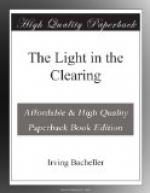She did her best, also, to keep our minds in a cleanly state of preservation—a work in which the teacher rendered important service. He was a young man from Canton.
One day when I had been kept after hours for swearing in a fight and then denying it, he told me that there was no reason why I shouldn’t be a great man if I stuck to my books and kept my heart clean. I heard with alarm that there was another part of me to be kept clean. How was it to be done?
“Well, just make up your mind that you’ll never lie, whatever else you do,” he said. “You can’t do anything bad or mean unless you intend to cover it up with lies.”
What a simple rule was this of the teacher!—and yet—well the very next thing he said was:
“Where did you hear all that swearing?”
How could I answer his question truthfully? I was old enough to know that the truth would disgrace my Uncle Peabody. I could not tell the truth, therefore, and I didn’t. I put it all on Dug Draper, although his swearing had long been a dim, indefinite and useless memory.
As a penalty I had to copy two maxims of Washington five times in my writing-book. In doing so I put them on the wall of my memory where I have seen them every day of my life and from which I read as I write.
“Speak no evil of the absent for it is unjust.”
“Labor to keep
alive in your breast that little spark of celestial
fire called conscience.”
The boys in the school were a sturdy big-boned lot with arms and legs like the springing bow. Full-lunged, great-throated fellows, they grew to be, calling the sheep and cattle in the land of far-reaching pastures. There was an undersized boy three years older who often picked on me and with whom I would have no peaceful commerce.
I copy from an old memorandum book a statement of my daily routine just as I put it down one of those days:
“My hardest choar is to get up after uncle calls me. I scramble down stairs and pick up my boots and socks and put them on. Then I go into the setting room and put on my jacket. I get some brand for the sheep. Then I put on my cap and mittens and go out and feed the sheep. Then I get my breakfast. Then I put on my frock, cap, mittens and fetch in my wood. Then I feed the horses their oats. Then I lay away my old clothes until night. I put on my best coat and mittens and tippet and start for school. By the time I get to Joe’s my toes are cold and I stop and warm them. When I get to school I warm me at the stove. Then I go to my seat and study my reader, then I take out my arithmetic, then my spelling book, then comes the hardest study that ever landed on Plymouth Rock. It is called geography. After the spelling lesson comes noon. The teacher plays with me cos the other boys are so big. I am glad when I go home. Then I do my choars again, and hear my aunt read until bedtime.”
There were girls in the school, but none like Sally. They whispered together with shy glances in our direction, as if they knew funny secrets about us, and would then break into noisy jeers. They did not interest me, and probably because I had seen the lightness and grace and beauty of Sally Dunkelberg and tasted the sweetness of her fancies.




